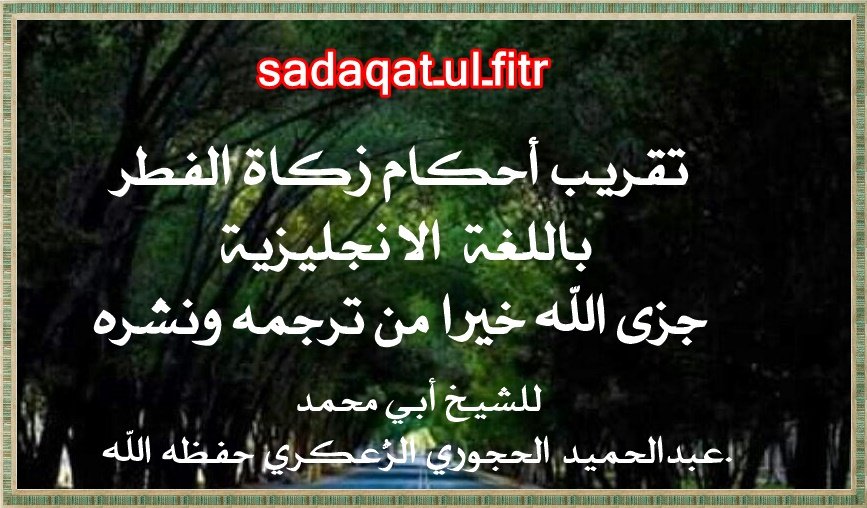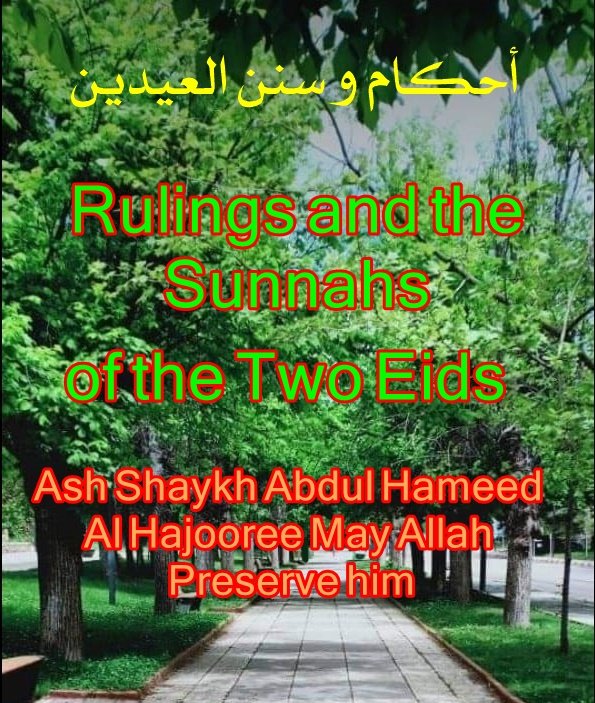الحمدُ لله، وَالصَّلَاةُ وَالسَّلَامُ عَلَى رَسُولِ اللَّهِ، وَأَشْهَدُ أَنْ لاَ إِلَهَ إِلَّا اللَّهُ، وَأَشْهَدُ أَنَّ مُحَمَّدًا عَبْدُهُ وَرَسُولُهُ ﷺ تَسْلِيمًا كَثِيْرًا، أَمَّا بَعْدُ:
The one who ponders over the legislation of Allah will find that the legislation includes worldly and benefits in the hereafter for the slave. He will find that it includes the right of Allah upon his slave, and the rights of the slaves amongst themselves, from that is, that which as come In Abu Dawood and Ibn Maajah from Ibn Abbas May Allah be pleased with him he said:
The Messenger of Allah (ﷺ) prescribed the sadaqah (alms) relating to the breaking of the fast as a purification of the fasting from empty and obscene talk and as food for the poor. If anyone pays it before the prayer (of ‘Id), it will be accepted as zakat. If anyone pays it after the prayer, that will be a sadaqah like other sadaqahs (alms).
That which is more authentic then this narration which indicates the obligation of this act of worship, is that which has come in the Saheehayn from Abdullah Ibn Umar May Allah be pleased with both of them:
Allah’s Messenger (ﷺ) has made Sadaqat-ul-Fitr obligatory, (and it was), either one Sa’ of barley or one Sa’ of dates (and its payment was obligatory) on young and old people, and on free men as well as on slaves.
The prophet ﷺ commanded that it be given before the people go out to the prayer, they used to also give it a day or two before Eid, Ibn Umar used to also gather it amongst those who were In charge of charities, and if it was a day or two before Eid he would give it to those deserving of it.
The best time to give it is that which is between the rising of the true dawn on the day of Eid and the Imam going out to the prayer, and the permissible time for it to be given is a day or two before (or three). If it is given before that then it does not count, and it is only to be considered a charity from the charities. If it is given after the Eid prayer, then it does not count, and it is only a charity from the charities as comes in the narration of Ibn Umar May Allah be pleased with them both
In the narration of Abu Saeed Al Khudri may Allah be pleased with him in As Saheehayn he said:
We used to give one Sa’ of meal or one Sa’ of barley or one Sa’ of dates, or one Sa’ of cottage cheese or one Sa’ of Raisins (dried grapes) as Zakat-ul-Fitr.
Some of the people of knowledge differed, his statement a Saa’ of a meal, is it from that which is general and that which comes after it is defines it? Or is the word meal here considered wheat which was the Staple food of the people of that time.
We also take from this narration that it is permissible to give Zakatul Fitr as staple food from that which was mentioned in this narration and that which was not.
The amount of it is, upon every young, old, male, female, free person and slave from the Muslims a Saa’. The Saa’ is four handfuls, and the Saa’ of the prophet ﷺ is known.
Our Shaykh Yahya may Allah preserve him estimated it to be equal to five cans of known pineapple cans. Some others have estimated it to equal to four cans of the oat soup.
Whilst some of the people of knowledge have estimated it to a certain number of Kilograms. Paying it in handfuls and the Saa’ is more befitting, following in it the prophet ﷺ and it is more precise
Some of them have estimated dates to equal 1 kilogram and 800 grams, rice to equal 2 Kilograms and 45 grams, or like that and wheat to equal 2 Kilograms. These estimations generally will hopefully meet the intent for the one who is not good at counting, as for the one who is able to count and do it by means of considering a Saa’ and handfuls then that is what was done in the time of the prophet ﷺ and should be done.
It is not permissible to give the Zakatul Fitr in the form of money, even if some of the people of knowledge have gone towards that (that it is allowed) but that which is correct is the opposite of that (that it is not allowed). For the prophet ﷺ made it obligatory in a form of Staple foods, and the companions may Allah be pleased with them were upon that as well.
Also, because giving it in form of Money does not meet the intent which is that it is food for the poor on that day so that they may have different forms of food to eat.
Also giving it as staple foods shows the sign of the mercy of the believers, where as a person sees an individual from the Muslims on the day of Eid going from house to house giving the poor food which Allah has obligated upon him.
This is what was deemed correct by Shaykhul Islam and others from the people of knowledge such as our Shaykh Muqbil, Shaykh Ibn Baaz, Shaykh Ibn Uthaymeen, our Shaykh Yahya Al Hajooree and many others.
The one whom receives this, Zakatul Fitr, is one group of people and it is the poor and destitute, It is permissible for a person to give Zakatul Fitr from that which one receives, if he is poor and he is given Zakatul Fitr then it is permissible for him, rather obligatory for him to give Zakatul Fitr if he has more than that which nourishes him for that day. It is also permissible for a Muslim to give Zakatul Fitr from that which the people have given to him as gifts.
It is also permissible, if he is busy or fears that he will not be able to give it himself that he entrusts someone to give his Zakatul Fitr, thus it is permissible to give one of them money, and then he buys by way of it food to give away.
As for that which is given in a form of money, then what is correct from the statements of the people of knowledge is that it does not count for him, and that it is not accepted due to two reasons:
1. It is leaving off the guidance of the prophet ﷺ
2. He has done something that the legislator has commanded with the opposite of. Money was present during their time and if the prophet ﷺ wanted to give it in a form of money he would have given them Deenars and Dirhams or that which he wanted. Allah says
:﴿وَمَا كَانَ رَبُّكَ نَسِيًّا﴾ [مريم:64].
and your Lord is never forgetful,
The origin is that Zakatul Fitr should be given in the land the individual is in, but it is permissible if he does not find one who needs it that he sends it to another land.
The origin is also that every Muslim gives it from his own self, the husband gives it himself, the wife gives it herself from the wealth of her husband, or her own wealth, but if the leader of the household gives it for everyone then it is something good and no problem in it.
These are some of the rulings which are connected to this act of worship
Zakatul Fitr is a must upon everyone except for the one who is not able to give it and has nothing, thus we should strive in giving this Zakat which Allah has obligated upon us, due to two reasons:
1. As a means of purification, there is none amongst us except that he has a mistake, sin, or indecent acts or speech in this month, we Ask Allah for safety
2. Providing food for the needy
It is also permissible that you give Zakatul Fitr to one individual and due to that he may have food for the whole year.
Matter: Some of them may say if we give barley or similar to it from food, the people may not use it now, and may give it to their animals, or they may not eat it? We are not ordered with them eating it or not we are commanded with giving it based upon that which the prophet ﷺ mentioned. The one who gives it from that (which people may not use) then it is good (in the fact that he gave it), and the one who gives it as rice or similar to that which the people use then that is also good.
ونسأل الله القبول والسداد.






